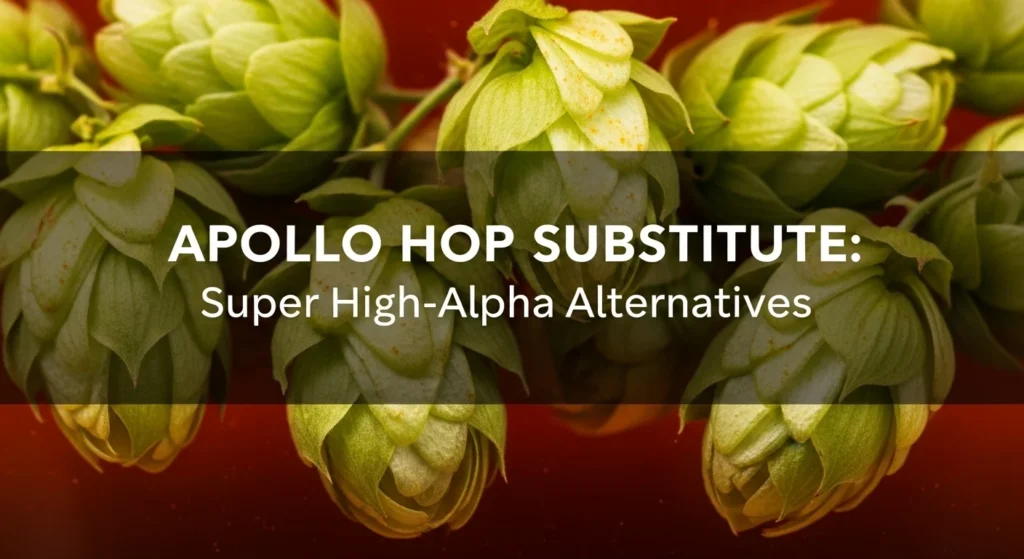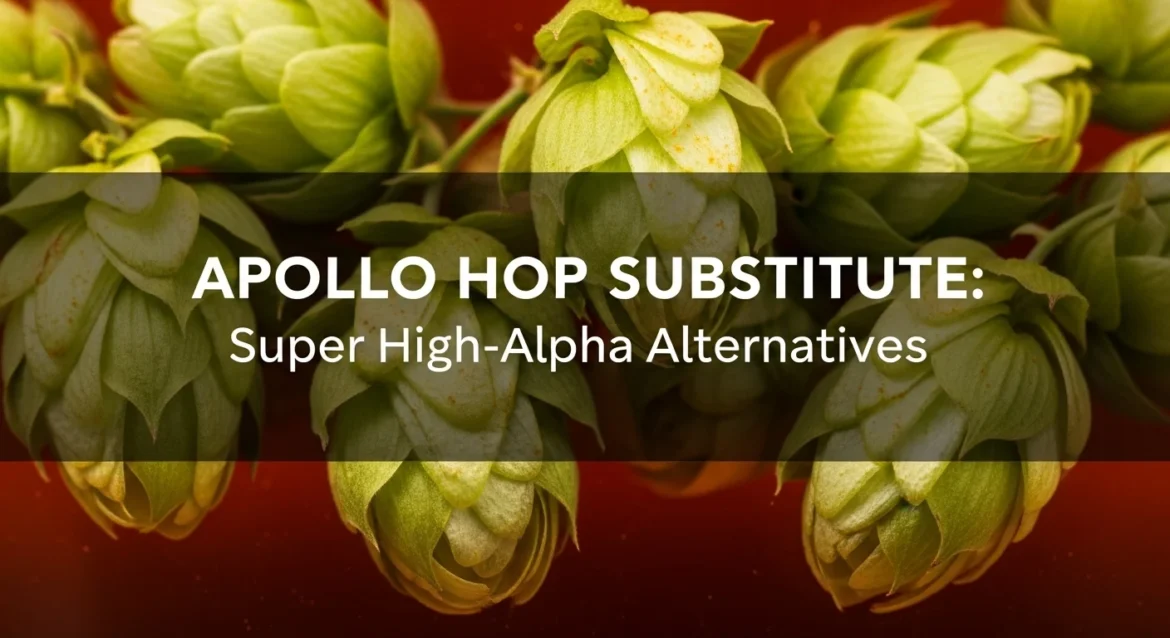Find the best Apollo hop substitutes with super high-alpha bittering power. Discover American alternatives for IPAs, double IPAs, and imperial stouts.

Planning that massive double IPA with Apollo hops only to discover they’re sold out everywhere? I’ve faced that exact frustration countless times in my brewing career. This powerhouse American super high-alpha hop has developed a dedicated following for its extreme bittering efficiency and orange-grapefruit character, creating demand that occasionally exceeds availability at local suppliers. The good news? Several American-grown hop varieties can replicate that distinctive combination of massive alpha acids and bold citrus-resinous notes that make Apollo essential for extreme beers.
Finding the right Apollo hop substitute requires understanding what makes this hop special beyond just astronomical alpha acids. It’s about capturing that distinctive combination of intense orange-grapefruit, resinous punch, and super high-alpha efficiency that revolutionized brewing when homebrewing equipment became sophisticated enough to handle extreme hopping rates. After brewing with Apollo and testing various alternatives over the past eight years, I’ve identified which substitutes actually deliver on their high-alpha promises and which fall disappointingly short when massive bittering power matters.
This guide explores proven alternatives that maintain your beer’s intended intensity while offering different dimensions. Whether you’re brewing a double IPA, barleywine, or imperial stout, you’ll find practical solutions that work.
Understanding Apollo’s Super High-Alpha Power
Apollo emerged in 2006 from Hopsteiner breeding as experimental variety 01051. This super high-alpha hop delivers orange, grapefruit, resinous, strong, and bitter characteristics with extreme alpha acids of 15-21%. What distinguishes Apollo from other high-alpha hops is its remarkably high alpha acid potential combined with distinctive orange-grapefruit character that creates efficient bittering with bold citrus aromatics when used in late additions.
The hop’s development represented American brewing’s push toward ever-higher alpha acid varieties that maximize bittering efficiency while minimizing hop material. Apollo’s extreme alpha acids create powerful bittering from minimal quantities while its bold citrus-resinous aromatics provide genuine complexity when dry hopped generously.
When I first brewed with Apollo in a double IPA six years ago, the massive bittering combined with bold orange-grapefruit backing created exactly the intense hop-forward character I sought. That extreme, unapologetic power is Apollo’s magic – efficient enough for massive IBUs yet complex enough to add aromatic depth.
Top Apollo Hop Substitute Options
Columbus: The CTZ Standard
Columbus stands as the most logical Apollo substitute for brewers seeking super high-alpha American character. This legendary variety delivers pungent, earthy, spicy, citrus, and herbal characteristics with very high alpha acids of 14-18% that approach Apollo’s range closely.
Released in 1994, Columbus (also called Tomahawk and Zeus – collectively CTZ) represents classic American high-alpha breeding. The hop shares Apollo’s emphasis on powerful bittering while offering earthy-spicy complexity instead of pure orange-grapefruit, creating versatile alternatives when extreme alpha acids matter.
I’ve successfully substituted Columbus for Apollo in IPAs and imperial stouts by using approximately equal weights thanks to similar alpha acids. The beer’s character maintains super high-alpha bittering power while shifting toward earthy-spicy rather than orange-grapefruit, creating classic American hop-forward profiles. Use Columbus when you want proven high-alpha performance with wide availability from the Brewers Association standards.
Nugget: Classic American High-Alpha
Nugget brings herbal, spicy, resinous, and heavy characteristics with high alpha acids of 12-14%. This American workhorse provides powerful bittering that can approximate Apollo’s efficiency while offering different flavor profiles.
Released by USDA breeding in 1970, Nugget represents early American high-alpha development. While lacking Apollo’s extreme alpha acid potential, Nugget’s reliable high-alpha bittering creates accessible alternatives when proven performance matters more than maximum efficiency.
When substituting Nugget for Apollo, use approximately 20-35% more by weight to compensate for lower alpha acids. The beer’s character shifts toward herbal-resinous rather than orange-citrus, creating traditional high-alpha bittering suitable for robust styles where clean bitterness matters.
Magnum: Clean Neutral Bittering
Magnum delivers clean, mild, slightly floral, and neutral characteristics with high alpha acids of 12-17%. This German-American variety provides exceptionally clean bittering that can replace Apollo’s efficiency while offering minimal flavor contribution.
Developed in Germany then cultivated in America, Magnum shares high-alpha breeding goals. While lacking Apollo’s citrus-resinous character, Magnum’s remarkably clean bittering creates neutral alternatives when pure alpha acid efficiency matters most without flavor complexity.
Use approximately 15-30% more Magnum by weight when substituting for Apollo to compensate for moderately lower alpha acids. The hop’s exceptionally clean character works perfectly for bittering additions where neutral bitterness supports rather than dominates aromatic hop additions.
Summit: Bold Citrus-Onion
Summit offers orange, tangerine, grapefruit, onion, and garlic characteristics with extreme alpha acids of 17-19% that match Apollo’s super high-alpha range. This American variety provides massive bittering with polarizing onion-garlic notes.
Released by Yakima Chief in 2003, Summit shares extreme alpha acid goals. The hop’s specific orange-tangerine component echoes Apollo’s citrus nature while adding controversial onion-garlic backing that divides brewers.
When substituting Summit for Apollo, use approximately equal weights thanks to similar alpha acids. The beer maintains super high-alpha efficiency while adding distinctive onion-garlic character that works in some styles but overwhelms others. Use Summit cautiously, testing first in small batches.
Chinook: Pine-Grapefruit Classic
Chinook brings pine, spicy, grapefruit, and herbal characteristics with high alpha acids of 12-14%. This American classic provides powerful bittering with distinctive pine character that creates alternatives to Apollo’s citrus focus.
Released in 1985, Chinook defined American hop-forward brewing alongside Cascade and Centennial. While lacking Apollo’s extreme alpha acids, Chinook’s bold pine-grapefruit profile creates characterful alternatives when distinctive American hop flavor matters.
Use approximately 25-40% more Chinook by weight when substituting for Apollo to compensate for lower alpha acids. The beer’s character emphasizes pine-grapefruit rather than orange-resinous, creating classic American IPA profiles with proven popularity.
Zeus: CTZ Alternative Name
Zeus delivers earthy, spicy, herbal, pungent, and citrus characteristics with very high alpha acids of 14-17%. This variety (actually Columbus sold under different name) provides identical performance to Columbus/Tomahawk with CTZ genetic heritage.
As part of CTZ (Columbus/Tomahawk/Zeus) family, Zeus represents same genetic material marketed under different names. The hop’s performance matches Columbus exactly, creating reliable alternatives when super high-alpha American character matters.
When substituting Zeus for Apollo, use approximately equal weights thanks to similar alpha acids. The beer maintains powerful bittering with earthy-spicy-citrus character matching Columbus performance.
Blending Strategies for Complete Substitution
The 60/40 High-Alpha Blend
My most successful Apollo replacement combines 60% Columbus with 40% Chinook. This blend captures Columbus’s massive bittering power while Chinook adds pine-grapefruit complexity approximating Apollo’s super high-alpha citrus-resinous profile. The combination creates more layered character than either hop alone.
Calculate your total hop bill first, then split according to this ratio for all additions. Use approximately equal total quantities to original Apollo amounts thanks to similar combined alpha acids while achieving bold American hop-forward character.
The Clean Bittering Approach
For maximum alpha acid efficiency with minimal flavor, use Magnum alone for bittering (60 minutes) then add Columbus or Summit for late additions and dry hopping. This strategy maximizes bittering efficiency while preserving expensive high-alpha hops for aromatic contributions.
Use slightly increased Magnum quantities (approximately 15-25% more than Apollo amounts) for bittering, then match Apollo late addition and dry hop quantities with Columbus or Summit for complete profiles.
Single-Hop Simplicity
Sometimes simplicity wins. For straightforward beers where super high-alpha efficiency matters most, Columbus alone provides the most direct substitution at equivalent weights. The hop’s proven performance and wide availability make it ideal when reliable high-alpha character defines the recipe.
For beers demanding extreme alpha acids with citrus character, Summit by itself works at similar quantities despite polarizing onion-garlic notes. Test Summit first before committing to full batches.
Beer Style Considerations
Double IPAs and Imperial IPAs
These extreme hop-forward styles showcase super high-alpha hops beautifully. Columbus or Summit work exceptionally well as Apollo substitutes, providing massive bittering power that supports generous late hop additions and aggressive dry hopping.
Use generous hopping rates (2-4 oz per gallon total across all additions) with substantial bittering (60-100+ IBUs) from high-alpha additions. Modern double IPA brewing demonstrates that extreme hop quantities create signature intensity.
Barleywines and Imperial Stouts
Massive malty styles benefit from Magnum or Nugget substitutions that provide powerful clean bittering balancing intense malt sweetness without excessive hop flavor.
Use moderate-high hopping rates (1.5-2.5 oz per gallon total) focusing on substantial bittering (50-80 IBUs) that creates balance rather than hop-forward character. High-alpha efficiency creates necessary bitterness from reasonable hop quantities.
American IPAs
Standard-strength hop-forward ales showcase Chinook or Columbus where bold American hop character defines the style alongside moderate-high bitterness.
Keep total hop rates generous (1.5-3 oz per gallon) with moderate bittering (40-70 IBUs) and substantial late additions. American IPA brewing balances bitterness with aromatic complexity.
Here is the comparison chart:
Apollo Hop Substitute Comparison Chart – Alpha Acids, Flavors, and Beer Style Compatibility
Timing Your Hop Additions for Maximum Impact
Dominant Bittering (60 Minutes)
Apollo’s extreme alpha acids (15-21%) create efficient bittering that maximizes IBUs from minimal hop material. Use Apollo substitutes primarily at 60 minutes to establish massive bitterness efficiently.
I typically use 0.5-1.5 oz per gallon at 60 minutes with Apollo substitutes to establish baseline bitterness around 60-100+ IBUs appropriate for double IPAs and extreme styles. The super high-alpha efficiency minimizes hop material while achieving extreme bitterness.
Late Additions (5-15 Minutes)
This window captures bold hop flavor without excessive bitterness. Columbus and Summit excel here, releasing citrus-resinous character that integrates powerfully.
Add 0.75-1.5 oz per gallon at 10 minutes for hop-forward styles. This timing extracts maximum flavor while preserving some aromatics that would be lost during extended boiling.
Whirlpool Dominance
Post-boil whirlpool additions at 170-180°F for 20-30 minutes maximize citrus-resinous character while controlling bitterness. This technique suits all Apollo substitutes by preserving bold aromatics.
Use generous whirlpool quantities (1.5-3 oz per gallon) for modern IPAs and double IPAs. The controlled temperature extracts massive aromatics while limiting additional bitterness from high-alpha varieties.
Aggressive Dry Hopping
Dry hopping extracts pure aromatics without bitterness, making it essential for maximizing Apollo substitute character. Add hops when fermentation is 75% complete (around day 3-4) to maximize biotransformation.
Use massive dry hop quantities (3-6 oz per gallon) for double IPAs, 2-4 oz per gallon for standard IPAs, and 1-2 oz per gallon for other styles. Columbus and Summit benefit from 3-5 day contact time for optimal extraction.
Adjusting for Alpha Acids and Character
Understanding Apollo’s Extreme Profile
Apollo’s extreme alpha acids (15-21%) create substantial bittering efficiency that moderate-alpha substitutes can’t match directly. When using Chinook (13% AA) to replace Apollo (18% AA), use approximately 1.4× the amount for equivalent bitterness.
Use this formula: (Apollo AA% ÷ Substitute AA%) × Original Amount = Substitute Amount. Most substitutes require 1.0-1.4× original quantities depending on specific alpha acid percentages.
Oil Content and Aromatic Impact
Apollo’s substantial oil content creates bold aromatic impact when dry hopped generously. Substitutes with different oil compositions emphasize different flavors – Columbus provides earthy-citrus, Summit adds orange-onion, and Chinook contributes pine-grapefruit complexity.
Water Chemistry for Hop-Forward Beers
High Sulfate for Hop Brilliance
Modern hop-forward brewing utilizes high-sulfate water profiles (200-350 ppm) that accentuate hop bitterness and create crisp, dry finishes showcasing hop character.
For Apollo substitutes in IPAs and double IPAs, target sulfate-to-chloride ratios of 2:1 to 3:1. The elevated sulfate brings forward hop character while creating dry finishes that encourage drinkability despite high bitterness.
Moderate Chloride for Balance
Some brewers prefer balanced sulfate-chloride profiles (150-200 ppm each) that create rounder mouthfeel while maintaining hop character. Experiment to find preferred mineral balance.
Yeast Strain Synergies
Clean American Ale Yeast
For hop-forward styles, exceptionally clean American yeasts (WLP001/US-05, Wyeast 1056) provide neutral canvases where massive hop character dominates without yeast interference.
Ferment at moderate temperatures (66-68°F) to minimize yeast-derived flavors. The clean profile lets Apollo substitutes’ bold character express fully without competition.
English Ale Yeast for Balance
For barleywines and imperial stouts, English ale yeasts (WLP002, Wyeast 1968) create moderate fruity esters that complement rather than compete with hop bitterness.
Ferment at appropriate temperatures (65-68°F) encouraging balanced ester production that adds complexity without overwhelming hop character.
Sourcing and Availability
Apollo Accessibility
Apollo enjoys moderate availability through American hop suppliers. When available, expect moderate pricing ($12-18 per pound) comparable to other super high-alpha American varieties.
The hop’s extreme alpha acids create efficient usage where small quantities provide substantial impact, making per-batch costs reasonable despite premium pricing.
Substitute Availability
Most Apollo substitutes enjoy excellent availability. Columbus, Nugget, Magnum, and Chinook stock reliably year-round through major suppliers at competitive prices ($10-16 per pound). Summit faces moderate availability through specialty suppliers. Zeus availability matches Columbus as same genetic material.
Storage Best Practices
Store all hops in oxygen-barrier bags in your freezer at 0°F or below. Super high-alpha hops maintain bittering power longer than delicate aroma varieties but should be used within 9-12 months for peak quality.
Common Substitution Mistakes
Wrong Alpha Acid Calculations
Failing to adjust quantities when using different alpha acid substitutes creates incorrect bitterness. Always calculate substitution amounts based on alpha acid ratios for accurate results.
Excessive Late Additions
Using super high-alpha hops excessively in late additions creates harsh resinous character. Balance bittering hops with lower-alpha aromatic varieties for better results.
Ignoring Onion-Garlic Notes
Summit’s distinctive onion-garlic character works in some beers but overwhelms others. Test Summit in small batches before committing to full-scale production.
Frequently Asked Questions
What is the closest substitute for Apollo hops?
Columbus provides closest overall match with similar super high-alpha range (14-18%) and bold American citrus-earthy character. Summit offers even higher alpha acids (17-19%) matching Apollo’s extreme efficiency with polarizing onion-garlic notes. Zeus provides identical performance to Columbus as same genetic material marketed differently.
Can I use just one hop instead of Apollo?
Yes, single-hop substitutions work excellently for super high-alpha applications. Columbus excels across all hop-forward styles with proven performance. Magnum suits pure bittering applications needing clean neutral character. Summit works in experimental beers tolerating onion-garlic notes. Choose based on desired character and alpha acid requirements.
How much substitute hop should I use compared to Apollo?
For Columbus (16% AA) replacing Apollo (18% AA), use approximately 1.13× the amount for equivalent bitterness. For Magnum (14% AA), use about 1.29× original amounts. For Summit (18% AA), match weights directly. Adjust based on specific alpha acid percentages using the formula provided.
Do these substitutes work in all beer styles?
Apollo substitutes adapt well across hop-forward and extreme styles. Columbus, Summit, and Zeus suit double IPAs, imperial stouts, and barleywines. Magnum works universally for clean bittering. Nugget and Chinook excel in standard IPAs and robust porters. Avoid super high-alpha hops in delicate lagers or wheat beers where gentle character matters.
When should I add these hops during brewing?
Use generous bittering additions (0.5-1.5 oz per gallon at 60 minutes) establishing massive bitterness (60-100+ IBUs). Substantial late additions (0.75-1.5 oz per gallon at 10 minutes) add bold flavor. Generous whirlpool (1.5-3 oz per gallon) maximizes aromatics. Aggressive dry hopping (3-6 oz per gallon for double IPAs) creates signature intensity.
Will my beer taste exactly the same with substitutes?
No substitute perfectly replicates Apollo’s exact orange-grapefruit-resinous combination with extreme alpha efficiency, but well-chosen alternatives create equally intense hop-forward character. Columbus emphasizes earthy-citrus, Summit adds orange-onion, and Magnum provides clean neutral bittering maintaining super high-alpha efficiency.
Where can I buy these substitute hops?
Major online suppliers like Yakima Valley Hops, Northern Brewer, BSG Craft Brewing, and Hopsteiner stock Columbus, Nugget, Magnum, Chinook, and Zeus year-round with excellent availability. Summit available through specialty suppliers. All substitutes maintain competitive pricing ($10-18 per pound) with reliable domestic production.
How should I store substitute hops?
Store all hops in oxygen-barrier packaging (vacuum-sealed mylar bags) in freezer at 0°F or below. Super high-alpha hops maintain bittering power for 9-12 months frozen with gradual alpha acid degradation. Use freshest hops for accurate IBU calculations in extreme hop-forward styles.
Making Your Final Choice
Selecting the perfect Apollo hop substitute depends on your beer style, desired intensity, and hop availability. Columbus offers most reliable super high-alpha matching for brewers seeking proven American character in double IPAs and imperial stouts where extreme bittering power defines the beer.
Summit provides maximum alpha acid efficiency matching Apollo’s extreme potential with polarizing onion-garlic character. Test Summit first before committing to determine whether its distinctive character suits your palate preferences.
Magnum delivers unmatched clean bittering for brewers maximizing alpha acid efficiency while preserving aromatic hop budget for late additions and dry hopping. Its neutral character works universally across hop-forward styles.
Remember that exceptional extreme beer comes from understanding super high-alpha hop roles and using them strategically. Apollo substitutions focus on maximizing bittering efficiency while preserving hop character for aromatic contributions.
Don’t be afraid to blend high-alpha varieties for complete profiles, use clean-bittering Magnum for efficiency, or embrace Columbus as proven Apollo alternative. The craft brewing community continues proving that thoughtful high-alpha substitution creates intensity worthy of extreme styles.
Whether you’re crafting a massive double IPA, robust barleywine, or imperial stout, these Apollo substitutes will help you create exceptional beer that captures super high-alpha intensity. Trust proper calculations, brew with bold hopping rates, and embrace the extreme character that makes modern hop-forward brewing so exciting and rewarding.
About the Author
Lisa Fermenta is a certified nutritionist and fermentation expert who explores the health benefits of probiotic beverages. Her journey began in her grandmother’s kitchen, where she learned traditional fermentation techniques that have been passed down for generations. Lisa has studied with fermentation masters across Asia and Europe, bringing global perspectives to her brewing approach. She regularly conducts workshops on kombucha, kefir, and other fermented drinks, emphasizing both flavor development and health benefits. When not experimenting with fermented beverages, Lisa enjoys maintaining her SCOBY library containing over 30 unique cultures from around the world. Connect with her on Instagram for fermentation insights and probiotic beverage tips.

